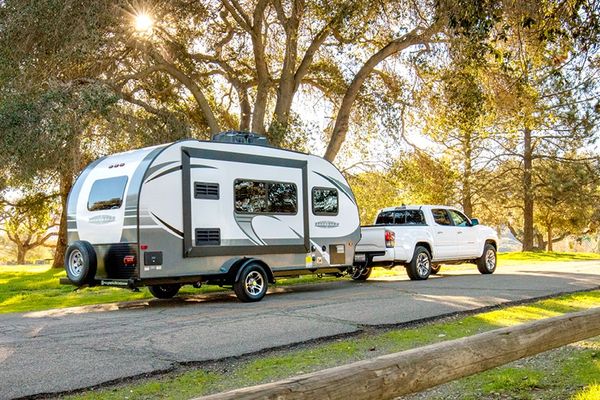
How Long do Travel Trailer Tires Last? (Tips to Last Longer)
Good tires are essential when you are pulling a load, having great tires under your trailer means a lot. They help you get where you are going safely along with helping you save a little on your fuel consumption. When you pull a trailer, tires are not a secondary issue to be ignored.
How Long do Travel Trailer Tires Last? On average a good trailer tire will last you about 5 to 6 years. Some people will have them last longer while others may not see even 5 years of use. There are many factors that contribute to the longevity or lack of it of your tires.
To find out how to contribute to a long life for your trailer tires continue to read our article. It is filled with the information you need to know to get the most out of your trailer tires.
- Tip #1: when you travel the best way to help your tires last longer is to make sure you keep the right air pressure inside. This helps your tires wear evenly and have them last you longer.
- Tip #2: While you cannot stop the tire aging process, tire covers do help to delay that fact of life. Good tire covers keep the UV rays and the heat off your tires making sure the sun doesn’t prematurely age your trailer tires
How Many Miles do Trailer Tires Last
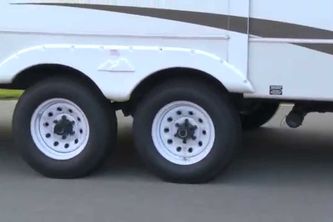
There is some debate on this subject but a good rule of thumb would be to change your trailer tires about every 10,000 to 15,000 miles. Of course, that would be subject to the type of roads you travel and how well you take care of them.
There are some people who argue that those figures need to be reduced considerably. They say that you should replace trailer tires every 5,000 to 12,000 miles. This is done in spite of the fact that some RV trailer owners travel 5,000 miles on one trip alone.
When they are done, they do not see any hard wear and tear on their tires. With the improvements time and technology have done over the years, it is a safe bet to go with the higher mileage range rather than the lower one.
Then just keep your eyes on your trailer tires. You will know when it is time to replace those tires. Also, you probably will replace your trailer tires for other reasons long before you hit 15,000.
Nails, glass, and other sharp road hazards tend to make the argument moot.Your load weight may have something to do with wearing your tires out long before the mileage is up on them.
- Tip #3: Try not to use a lot of chemicals on your tires when you are cleaning them. Chemicals react in a negative way when in contact with rubber. The fewer chemicals you use the longer your tires should last.
How Long Should Trailer Tires Last
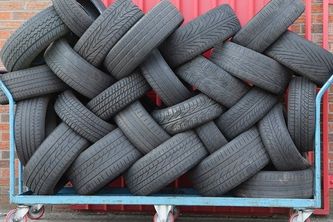
If you are lucky, you should get a good 6 years out one set of trailer tires. That is if you watch the roads you drive on and avoid a lot of pot holes and other tire obstacles that are not tire friendly.
Then if you do take care of them, you may find that they will last you longer the 6 years. But after that time, you really need to keep an eye on them as the rubber will definitely be weaker and prone to more issues you come across as you drive.
If you get less than 5 years use, then you may be doing something wrong. You may put too much load on them, under inflate them or even over inflate them. Plus, you may be putting the wrong tires on your trailer’s axle or axles.
These situations tend to reduce the life span of those costly tires you shelled good money out to get. The other thing you should be aware of is that if you are putting a lot of miles on your trailer in one year, then do not expect the tires to hit that6 year mark.
Don’t forget there are always exceptions to the rule. Some people may get 20,000 to 30,000 miles on their trailer tires over a 10 to 20 year term. They are the rare cases not the rule.
- Tip #4: Watch your speed. Most, if not all trailer tires, are rated to be run at 65 miles an hour and no faster. If you want your tires to last longer, slow down and do not exceed that speed limit.
Why do Some Trailer Tires Blow Out or Fail Earlier
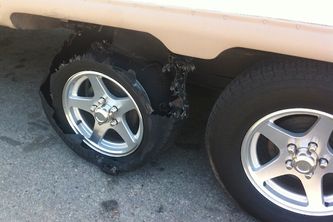
There are two main reasons why this takes place. First, trailer owners overload their trailers and put too much weight on the tires. You cannot exceed the load range capacity for tires or axles and expect them to perform like their is not weight on them.
The second main cause for early tire blowouts or failure is that too many trailer owners do not think twice about the air pressure those tires are at. Under inflated tires tend to blow out quicker than properly inflated ones.
There are also other culprits that contribute to this issue. Heat is one of them If the road is hot or the weather is warmer than usual, you can expect a little trouble. Even if you are sitting at the side of the road, a hot day can do damage to your tires and have them blow when you are at 65 mph.
Then there are bad roads that help cause tires to blow out or fail. Pot holes, and other obstructions hurt tires especially if they are driven over repeatedly. You may miss those pot holes and dangerous obstacles but all it takes is just one to hit at the right spot and there goes your tire.
Finally weather, long periods of non-use and bad maintenance all contribute to early tire failure and blow outs. If your trailer is going to sit for long periods of time, you should use a tire cover to protect them. Also, make sure to do proper maintenance regularly. Being safe is a lot better than being sorry.
- Tip #5: Check the date codes on your tires. The code is found after the DOT letters and the first 4 letters or numbers after that code. You can go to this link and check the code. The age of the tires is not dated to when you bought them but when they were actually made.
Travel Trailer Tire Life vs Usage
Travel trailer tire life may be long and enjoyable. That is because you may not be using your travel trailer very much each year. But even if you do not use your travel trailer that much, the tires on your trailer still get wear and tear.
Travel trailer tires are still enduring the effects that the outside world brings its way, including just sitting in your driveway or backyard. The tires still hold up the weight of the trailer, they have to endure the ever changing weather patterns and the rise and fall of the daily and seasonal temperatures.
These elements and more still take their toll on your travel trailer even though you only use it for 2 to 3 weeks of the year. Your usage may also affect those tires. If you go off the beaten path to a great lonely campsite, those uneven and rocky roads can play a part in shortening your travel trailer tires’ lifespan.
No matter if you use the trailer or not, your travel trailer tires will receive wear and tear and you may not have 2,000 miles on them. It is not usage alone that shorten the life of your travel trailer’s life.
- Tip #6: The more you run your RV the better it is for your tires. Tires can crack and dry out if left standing for long periods of time. Movement helps release built-in lubricants that keep your tire’s rubber in top shape
How to Make Trailer Tires Last Longer
One way to protect your tires and have them last longer is to not over wash them. Washing can remove vital chemicals built into your tires that they need to live a long life.
Another way is to use the right tires for the job. There is a reason why some tires are labeled as St and why some are labeled as LT or P. The P stands for passenger, the LT for light trucks and neither have any business being on a trailer.
The ST stands for Special trailer and they are specifically designed to handle the loads trailers carry. These are the tires you want on your trailer if you want longer lifespans. Also, do not over or under inflate them.
On top of that, you do not want to overload your tires. If you are hauling 10,000 pounds of trailer and contents, you do not want tires rated for 2,000 pound load range on your trailer’s axles.
Get the right tires to handle the load or remove some items from your trailer until the load is at or under the load range limit of your trailer tires. Finally, treat your tires well. If you do, you may get about a 50% increase in their lifespan.
That is good news when you rather spend your money on more entertaining activities than tires.
- Tip #7: try not to let your trailer sit longer than 6 months at a time. Long periods of non-use adds to the downfall of your tires.Plus, if you use a facility to store your trailer, check it out to make sure indoor conditions do not damage your tires over the long run.
When Should You Consider Replacing Your Trailer Tires
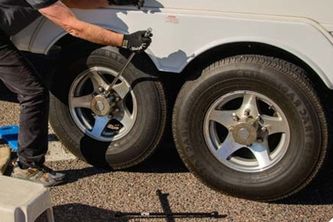
One of the first signs that you should be aware of when checking your tires is the tread depth. If they have been worn down to 2/32 or 1/16 of an inch, then you should replace them and go with a new set.
A second sign is when you start to see cracks in your trailer’s tire. These cracks can help let air out and put you in a dangerous position as you drive down the road. Then, if you see deformities, like bulges or bubbles, you should consider replacing your tires as soon as possible.
Flat spots or bald spots are another sign telling you the tires just won’t make your next trip. The age of the tire is the next important sign reminding you that tires do not last forever.
While you may get a couple more years of use out of them when they reach their 5th year, this is not always a smart move to make. Finally, the mileage. Even if those tires look great, you need to consider the amount of miles you have put on them.
At the 10,000 mark you should be thinking about what tires sales are going on and if trailer tires qualify for those sales prices.
- Tip #8: Under or over psi is not the only culprits to a short tire life.If your trailer’s axle is not properly aligned, then you could shorten the tires’ lifespan considerably. Check the alignment as a trailer’s axle is affected by pot holes, bumps, rocks and other impacts
How to Check Trailer Tire Age
As stated earlier, there is a code on your tires that help you check their age. The key to knowing their age is that the tire’s life does not start the moment you purchased them.
The tire’s life countdown begins when it rolls off the assembly line and placed into the holding racks waiting to be shipped out to dealers and gas stations When you are thinking about replacing your tires, you must take this time frame into consideration.
Also, you should be considering how long they sat on the dealer’s shelves before you came along and bought them. All those months are part of the age of the tire. In the previous section we also gave you a link to check that code to get the actual age of your tire.
Knowing codes not only help you place the right tire on your trailer, it helps you figure out when they are ready to be replaced. The last four digits in the overall code are your dates for age.
For example, if the tire code reads 2815, that means that the tire was made in the 28th week of 2015.
- Tip #9: Before you begin your journey and every tie you start on a long drive during that journey, you should check the tire inflation rate. Knowing your tire pressure helps you do routine tire inflation or deflation actions protecting you from any trouble that may come.
How Long Boat Trailer Tires Last
Boat trailers do not normally get a lot of use unless you are going out fishing every weekend. Also, depending on the type of boat you are hauling, the load amount may not affect the tires that much.
Under these light conditions, it is not unheard of for boat trailer tires lasting 10 years. After 10 years you may want to start thinking about replacing those tires. Any trailer tire does not have a long life span regardless of the mileage put on them.
The same conditions listed above apply to boat trailer tires as long periods of non-use will wear their integrity down and other conditions also affect their wear and tear. It is also not advisable to drive with boat tires that are 8 years old.
But that is your call as your experience may be different. Like RV tires there will be exceptions to the rule and some boat trailer tires may not last beyond 3 years with only 6,000 miles on them.
One way to positively contribute to your boat trailer lifetime is to make sure when it is not in use, lift the tires off the ground and keep them away from ground moisture. You will want to cover them keep a lot of the weight off.
Also, from time to time, just move the boat a few feet or so just to rotate them and keep them in good shape.
- Tip #10: If possible do not store your RV trailer with the wheels touching wet ground or concrete. The wet ground and concrete can help those tires absorb moisture and shorten the tires’ lifespan
Frequently Asked Questions About Trailer Tires
In this section we will answer some of those questions you may have on your mind that were not answered in the above sections.
- #1. What is the correct tire pressure for a trailer tire?
Like car and light truck tires, trailer tires will have a maximum psi listed on the tire. Now that number may not be the same even if the tires of different load range classifications fit the same wheel. For example, a ST175/80-13 load range B can hold 1,100 pounds at 35 psi. But a # AM10210 load range D fits the same wheel yet can hold 1,610 pound at 65 psi. Check with your dealer to get the correct psi for the load you are carrying
- #2. What speed can I travel at when pulling my trailer?
We did answer this earlier but here is a more detailed response. Trailer tires manufactured prior to 2015 can only go at 65 mph or less. Since that time, 2015 and onward, there are 3 speed classifications- M can go 81 mph; L goes up to 75 mph; and J which can go only 62 mph or less.
- #3. Should I use bias ply tires or radials on my trailer?
A bias ply tire has cords that run only at 32 degree angles toward the direction of travel. While the radial runs cords at 90 degrees in the same direction. The radial has better flexibility and ground contact, plus, it runs cooler than a bias ply tire. The cooler tire will last longer while the bias tire is better for off road travel. In the long run depending on load, travel conditions, etc., a radial may be the better tire to use.
- #4. What is the DOT code?
The DOT in the DOT code stands for department of Transportation. You can find it on the side of the tire near the bead. The next two numbers or they could be letters identify the location where the tire was made. Then the last four digits give you the date code
- #5. Do I need to match my tires or will any tire marked ST work on my trailer?
It is tempting to get tires at special low prices even if they do not match up. But like a car or light truck, this is not a viable option for pulling your trailer. You should have matching tires at all times unless in an emergency situation. Each tire should have the same size, load range, and construction
- #6. Does it really matter if the load range is not the same on all trailer tires?
Yes it does matter. The load range of one tire may be too weak to handle the weight of and in the trailer. This puts you and your family at risk of a tire failure. Plus, you may lose fuel economy, and add wear and tear to all your tires, costing you more money to replace them.
Some Final Words
Trailer tires are an important part of your RV experience in a long line of important parts. But without good tires on your trailer, you are not going to get very far. Making sure you know how long they last, how much mileage you can put on them and their load ranges, etc., will have them lasting you a long time.
Keep in mind that usage and tire life are not necessarily the same thing. Tires will age whether you use them or not. Also, you need to accept the fact that you and your trailer tires are part of the rule, not the exception.
What that means is you may not get 10,000 miles on your tires or have them last past 7 years. You need to practice good tire care and maintenance just in case.

